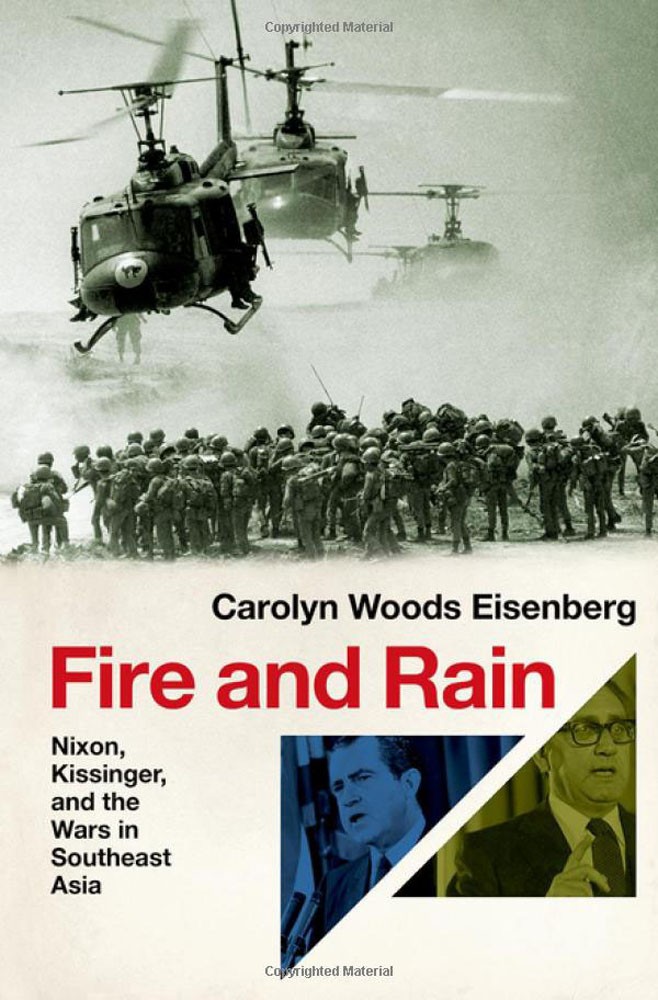 |
The Horror, The Horror . . .By Ed White (reviewer)
Fire and Rain: Nixon, Kissinger, and the Wars in Southeast Asia In the American Civil war, Lee commented to General Longstreet, after witnessing the carnage at Fredericksburg: "It is well that war is so horrible, or else we should grow too fond of it." And in the movie Apocalypse Now, Colonel Kurtz repeats those very words just before he is slaughtered. The horror, the horror… Author Carolyn Eisenberg's new book is not just one more book about Vietnam; rather, she exposes yet another horror: The lack of empathy or concern President Richard N. Nixon and Secretary of State Henry Kissinger held about those being slaughtered on their watch. Eisenberg is well suited to make these judgments. She listened to countless hours of the recently declassified Nixon tapes; read thousands of transcripts of Henry Kissinger's telephone calls, and researched cables from the Pentagon; listened to many anti-war interviews; read memoirs and diaries, as well as numerous interviews with the North and South Vietnamese. Carolyn Eisenberg says she spent 10 years researching this book. It certainly shows in the 519 pages, 28 chapters, and extensive bibliography. One of the central horror stories the author unveils is the destruction carried out by B-52 bombers in Cambodia and Laos. This story reads like a torture session. In vivid and deep detail Eisenberg describes the three key decision makers, Richard Nixon, Henry Kissinger, and General Alexander Haig, and their constant adherence to the strategy of endless bombing to get North Vietnam to the negotiating table. In my view, the constant B-52 pounding of Vietnam and neutral countries can only be described for what they were: War crimes. Eisenberg extensively details the attempt by these three men to get China and the Soviet Union to pressure North Vietnam. When these attempts failed, Nixon called out the B-52s for yet more, and more, and more bombings. At one point in the war, President Nixon—screaming at the military chiefs— berated the Air Force for not flying in bad weather. Neither Nixon nor Kissinger witnessed the results of the bombing on civilians, and the author implies that they did not care. In a unique contribution to the many solid books written about Vietnam, in the past 50 years, Carolyn Eisenberg pays close attention to the anti-war movement and to the question of whether it made a difference in ending the war. The author especially describes the role played by the Vietnam Veterans Against the War (VVAW). Chapter 12 of her book focuses exclusively on VVAW and its commitment to ending the war. She stresses how returning combat veterans became involved in peace marches; offered testimony before the Senate Foreign Relations Committee; participated in the teach-ins on college campuses; held the Winter Soldier Investigation in Detroit, Michigan; and threw away medals before the Capital; and how the FBI infiltration of VVAW; the Last Patrol demonstrations at the Miami Convention; and student protests on campuses around the country all formed to create a peaceful response to end the war. While Eisenberg does not provide direct quotes from the key players in the White House regarding changing policy on the war, she does claim that the anti-war movement had a strong impact on the Democratic Party which brought more anti-war Congressmen to submit numerous bills to stop funding the war. None passed. And Nixon—calling himself the "Peace President" —claimed he was the one ending the war, and those who opposed him were unpatriotic. The Vietnam Moratorium Committee was a particular thorn in the side of Nixon and Kissinger and its influence on members of Congress. But at a press conference, President Nixon declared, "Under no circumstances will I be affected by it." That is not what Carolyn Eisenberg discovered. In her research, the author learned that Nixon's comments were, in fact, untrue. Nixon was affected to be sure, but he was not affected enough to cease bombing innocent civilians in four countries. The President would simply curse all those who disagreed with him and attack anyone who leaked information contrary to his public statements. One of the key takeaways for me after reading Eisenberg's book was that both Nixon and Kissinger were unwilling to stop a futile war, and that decision was part of their character, their identity. Each time they sent the B-52 bombers into additional and unnecessary sorties, they risked the lives of the American pilots, and they also created even more insurgents to fight the US troops and their Allies. If there is another "horror" in war, this is the lesson: Nixon's actions created insurgents as the bombing continued and inspired them to fight even harder. Surely this lesson should have been applied to future wars after Vietnam, especially in Iraq and Afghanistan, to name just two additional "forever wars." Although he is not a favorite of mine, Samuel Huntington astutely pointed out: "The West won the world not by superiority of its ideas or values or religion (to which few members of other religions were converted) but rather by its superiority in applying organized violence. Westerner's often forget this fact; non-Westerners never do." That is yet one more horror of war. Ed White is a Marine Vietnam combat veteran with memberships in VVAW, VFP, and VVA. He has taught courses on the Vietnam War at Triton College in Illinois; his lecture: "The Lessons of Vietnam" can be viewed on C-Span.
|


